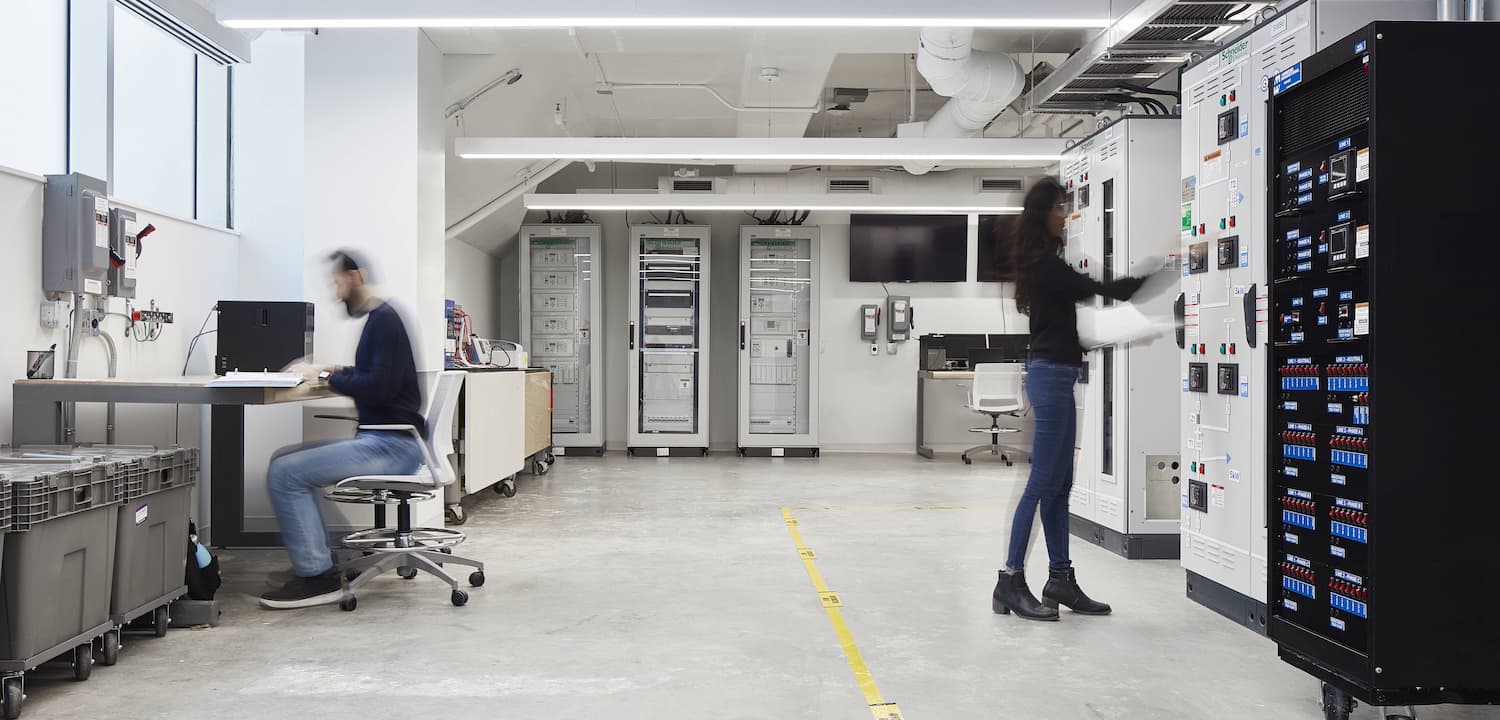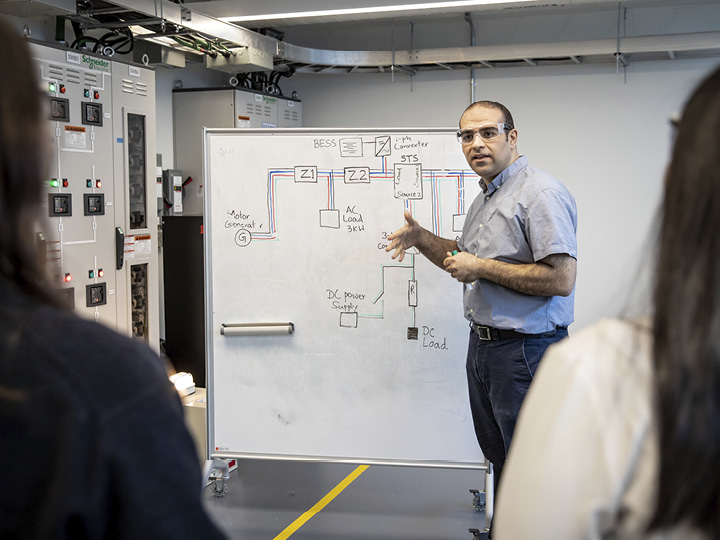SDG 7: Affordable and Clean Energy


SDG 7: Affordable and Clean Energy
Through our academic programs, research activity, Zone Learning and campus operations, TMU is actively contributing to developing and ensuring access to affordable, reliable, sustainable and clean energy for all. The university’s Sustainability Action Plan and related guidelines for campus activities further demonstrate our commitment to take tangible steps towards a sustainable future.
Moreover, TMU is recognized as a leader in clean energy development for its research excellence and incubation programs at the Centre for Urban Energy.
In 2023, 50% of the energy used on campus was from low-carbon or no-carbon sources from the Ontario electricity grid, such as nuclear, wind, solar and hydro.
The Clean Energy Zone incubator, housed at the Centre for Urban Energy, has supported
62 startups.
Our goals in action

TMU’s leadership in advancing clean energy development and storage reaches across our teaching facilities. In addition to offering courses that promote clean energy to our full-time students, we support lifelong learning and professional development opportunities for people outside of our university community in an effort to extend our impact.
- TMU offers a variety of courses related to energy development and storage. Students interested in taking energy-related courses can choose from options across various disciplines, as listed in (google doc) TMU’s sustainability course inventory (external link) .
- TMU offers a Professional Master’s Diploma in Energy and Innovation and an Electrical Engineering 101 seminar series for people without an engineering background.
- The Green Labs Program at TMU presents an opportunity for lab users to lead by example and implement safe and sustainable solutions to reduce the environmental footprint of their labs. Participants learn about best practices, exchange ideas, participate in events and competitions, and access resources designed to help them succeed.
At TMU, we are known leaders in clean energy research. Our reputation is based on our advanced research facilities and the strong partnerships we have forged with universities, government and industry to develop clean energy solutions. Our contributions to the field are broad, ranging from supporting clean energy projects in government facilities to incubating clean energy startups and evaluating innovative energy storage options.
- The Centre for Urban Energy (CUE) at TMU is a partnership with industry, government and top researchers from across Canada and the world that develops and commercializes sustainable, innovative and cost-effective clean energy solutions and technologies. CUE combines engineering, science, environmental issues and infrastructure management to tackle challenges, such as the development of clean energy technologies; the advancement of smart grid technologies; the integration of energy storage, electric vehicles and renewables; energy conservation and demand management; alternative local energy generation; carbon footprint reduction; and net-zero buildings and infrastructure.
- Founded in 2012, TMU’s Clean Energy Zone, housed at CUE, is an incubator focused on clean, sustainable energy innovations including electric vehicles, renewable energy, energy storage and distribution, microgrids and net-zero city building. It brings researchers, students and industry partners together to commercialize sustainable solutions that address societal needs and provide real environmental, social and economic impact. Members of the Clean Energy Zone develop their ideas while learning new skills to improve their business acumen and technical expertise. Zone members can access state-of-the-art research labs, co-working spaces and curated mentorship from industry partners, academic researchers and faculty.
- The Schneider Electric Smart Grid Lab serves as a hub for researchers and practicing engineers. It is a collaborative facility for testing and demonstrating smart grid ideas and products to modernize the electricity delivery system and the engagement of customers in managing their electricity usage.
- Toronto Metropolitan University and the Natural Sciences and Engineering Research Council of Canada (NSERC) are proud to lead a five-year, $5 million pan-Canadian network of 15 universities and 26 industry and government partners focused on the future of energy storage, an essential technology in the global transition to clean energy. The NSERC Energy Storage Technology Network (NESTNet) collaboratively explores many different types of energy storage, including flywheels, lithium-ion batteries and compressed air, and determines how best to integrate these technologies into electricity grids.
Driven by our commitment to being leaders in clean energy, TMU has taken serious steps to reduce energy-related emissions on campus. Among them, we have put procedures in place to ensure that our campus facilities are responsible consumers of energy— today and well into the future.
- Our (google doc) Sustainable Building Guidelines (external link) ensure that our commitment to carbon reduction and environmental sustainability is reflected in the design and creation of our spaces. The guidelines include robust energy and greenhouse gas (GHG) emissions performance targets, waste reduction, diversion goals and other requirements that promote sustainable building design. The guidelines apply to all capital projects (new construction, additions and major renovations) and minor renovations with carbon and energy implications (as applicable), and should be included in all requests for proposals.
- TMU published an updated (PDF file) Energy Conservation and Demand Management Plan in 2024 to help guide its efforts to reduce campus energy consumption, operating costs and greenhouse gas emissions and improve energy efficiency. The plan also fulfills the Ontario Regulation 507/18 reporting requirement.

At TMU, creating a full experience for our students means shaping and empowering them to become the leaders of tomorrow. That’s why, in addition to the courses, labs, Zone Learning and on-campus initiatives geared towards supporting and advancing affordable and clean energy, we host dedicated events to provide students with additional opportunities to learn more about and discuss our shared goal.
- The Centre for Urban Energy hosts an annual Clean Energy Expo, which includes opportunities for researchers and graduate students to address important energy challenges in energy storage, smart grid, renewables and more. The event also allows students to network with professionals in the energy sector.
At TMU, leading the way in clean energy research is, first and foremost, a means to creating real impact in our community. As such, beyond committing to reducing emissions on campus, we are working with the government to develop strategies to advance clean energy, support responsible investment decisions, and help develop and grow cutting-edge businesses advancing clean energy initiatives.
- In 2024, TMU launched its Sustainability Action Plan, a five-year plan to guide transformative change and empower our community members to contribute meaningfully towards a greener, more inclusive future. The plan includes a goal of achieving net-zero Scope 1 and Scope 2 emissions by 2045.
- TMU Engineering professor Seth Dworkin, the Canada Research Chair in High Performance Computing and Sustainable Energy, along with his team, is collaborating with industry partner Innovia GEO to develop and test an innovative geothermal heating and cooling technology that would be suitable for use in low- and mid-rise buildings, including residential homes.
- TMU was a participant in the working group that supported the development of Ontario’s Low-Carbon Hydrogen Strategy (external link) .
- The university does not directly invest in individual company stocks, but holds units of pooled funds or a percentage of holdings in portfolios. The university affirms that the endowment fund is invested in an ethical pooled fund where ethical filters are applied to exclude companies engaged in such activities as firearms, military contracting and more. Most recently, the university has confirmed with its investment manager that there is no exposure in the endowment fund to companies contained in the OHCHR (Office of the United Nations High Commissioner for Human Rights) database.
Stories
